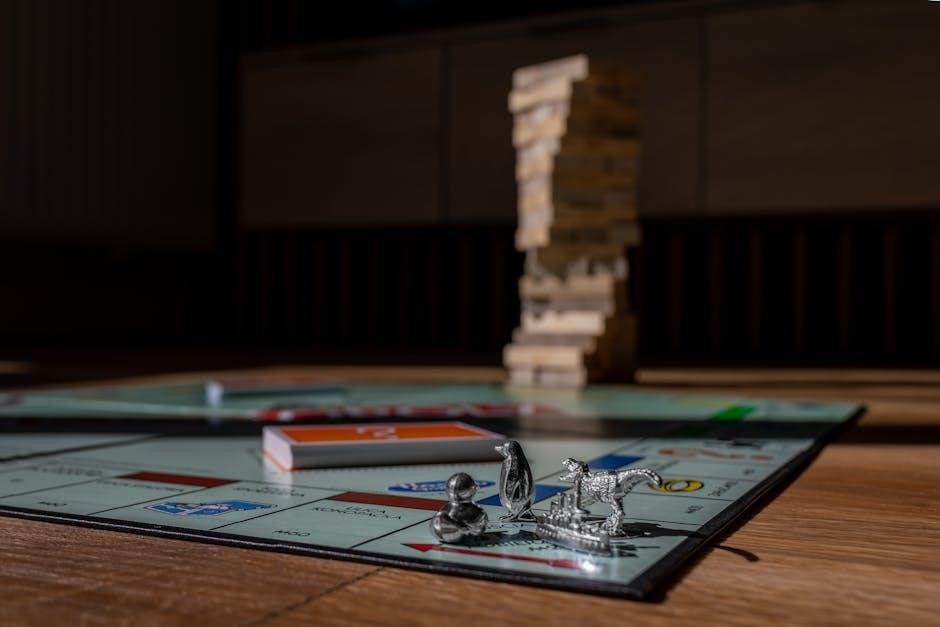Monopoly Deal is a fast-paced card game for 2-5 players, ages 8+, offering a strategic blend of luck and skill; The Deal Breaker card adds excitement by allowing players to remove a property from a completed set, introducing unpredictability and requiring adaptability. Understanding the rules is essential for mastering this quick-playing family favorite, which simplifies the classic Monopoly experience into a dynamic card-based format.
Overview of the Game
Monopoly Deal is a fast-paced card game inspired by the classic board game, designed for 2-5 players aged 8 and above. It combines strategy and luck, focusing on collecting property sets, using action cards, and building houses and hotels. The game is quick to learn but requires tactical thinking to outmaneuver opponents. Action cards like the Deal Breaker add unpredictability, allowing players to disrupt completed sets. This family-friendly game offers a fresh, dynamic twist on the Monopoly experience, making it accessible and enjoyable for all skill levels.
Importance of Understanding the Rules
Understanding the rules of Monopoly Deal is crucial for ensuring fair play and maximizing enjoyment. Misinterpreting rules, such as the Deal Breaker card’s ability to remove a property from a completed set, can lead to confusion and disputes. Knowing how to handle action cards, property sets, and building requirements prevents misunderstandings and ensures a smooth, competitive experience. Grasping the rules also helps players make strategic decisions, giving them a competitive edge and enhancing overall gameplay satisfaction for everyone involved.

Number of Players and Ages
Monopoly Deal is designed for 2-5 players, making it ideal for family fun. The recommended age range is 8 and above, ensuring engaging gameplay for all participants.
Recommended Age Range
Monopoly Deal is suitable for players aged 8 and above, ensuring a balance of simplicity and strategy. This age range allows children to grasp basic gameplay while adults enjoy the depth. The game’s complexity is manageable for younger players, promoting strategic thinking and financial literacy. Its fast-paced nature keeps all ages engaged, making it a versatile option for family gatherings or casual play with friends. The recommended age ensures everyone can participate and enjoy the game’s exciting mechanics.
Minimum and Maximum Number of Players
Monopoly Deal accommodates 2 to 5 players, ensuring dynamic interactions and strategic depth. With 2 players, the game is fast-paced and competitive, while 5 players introduce more complexity and unpredictability; The flexibility in player count makes it ideal for various social settings, from intimate duels to lively group sessions. This range ensures balanced gameplay, keeping all participants engaged and invested in their quest to win. The game’s design thrives with multiple players, enhancing the overall experience.
Components of the Game
The game includes a deck of cards featuring properties, action cards, and Monopoly money, along with a comprehensive rulebook to guide gameplay and strategy effectively.
Types of Cards
The game features three main types of cards: property cards, action cards, and money cards. Property cards are grouped into sets by color and location, similar to the classic Monopoly board. Action cards, such as Deal Breaker and Rent, allow players to disrupt opponents or collect payments. Money cards provide the funds needed to pay rent or complete property sets. Each card type plays a unique role in achieving victory, making strategic card management essential for success in the game.
Monopoly Money
Monopoly Money is a key component in the game, used to pay rent, complete property sets, and execute certain actions. Players earn money through rent collection or by using specific action cards. Managing money wisely is crucial, as it determines your ability to acquire properties and disrupt opponents. Proper financial strategy can lead to victory, while poor management may result in losing valuable opportunities. Money cards are essential for maintaining control and flexibility during gameplay.

Setup and Initial Preparation
The game begins with shuffling the deck and dealing cards to each player. Ensure the draw pile is face down, and each player receives the correct number of cards to start the game effectively.
Shuffling and Dealing Cards
To begin, shuffle the deck thoroughly and deal the appropriate number of cards to each player. The exact number of cards dealt depends on the number of players, ensuring fairness. The remaining cards are placed face down in a draw pile. The top card of the draw pile is turned over to start the discard pile. This setup ensures the game starts randomly, with no player having an unfair advantage. The player to the left of the dealer typically goes first.
Initial Hand and Draw Pile
Each player begins with a set number of cards, typically five, dealt from the shuffled deck. The remaining cards form the draw pile, placed face down. The top card of the draw pile is turned over to create the discard pile. Players must draw a card at the start of their turn, adding to their hand. The draw pile is essential for replenishing players’ hands, while the discard pile grows as cards are played or discarded during the game, maintaining the flow of gameplay. This setup ensures a balanced and dynamic start for all players.
Objective of the Game
The goal is to collect and complete property sets to earn the most money. Players strategically use action cards to disrupt opponents and secure victory by completing sets.
Completing Property Sets
Completing property sets is the core objective, as they generate income and lead to victory. Players collect and group properties into sets, which can include action cards like wilds or doubles to enhance their value. The Deal Breaker card can disrupt completed sets, removing a property and forcing strategic adaptation. Building houses and hotels on completed sets increases rent potential, making set completion a critical path to accumulating wealth and securing the win in this fast-paced card game.
Using Action Cards Strategically
Action cards are powerful tools that can dramatically influence the game. The Deal Breaker card allows you to remove a property from an opponent’s completed set, disrupting their strategy. Other action cards, like Rent or Sly Deal, can force opponents to pay you or steal their properties. Timing is crucial; use these cards to counter opponents’ moves or protect your own assets. Strategic use of action cards can turn the tide of the game, making them indispensable for achieving victory in Monopoly Deal.

Gameplay Overview
Monopoly Deal combines luck and strategy in a fast-paced card game. Players collect properties, use action cards, and negotiate to outmaneuver opponents. The Deal Breaker card adds unpredictability, allowing players to disrupt completed sets, ensuring dynamic and competitive gameplay.
Turn Structure
A player’s turn consists of drawing a card and playing one card from their hand. They can collect rent, use action cards like Deal Breaker, or build on properties. Each turn, players aim to complete sets, disrupt opponents, or strategically manage resources. The game’s fast-paced nature requires quick decisions, balancing risk and reward. Understanding the turn sequence is crucial for effective strategy and maximizing opportunities to outmaneuver others in this dynamic card game.
Actions During a Turn
During a turn, a player draws one card and plays one card from their hand. They can collect rent, use action cards like Deal Breaker to disrupt opponents, or build houses/hotels on completed property sets. Players can also choose to pay rent if required. The turn structure allows for strategic decisions, such as timing actions to maximize impact or minimizing losses. Effective resource management and timely card play are key to gaining an advantage and progressing toward victory in this fast-paced game.
Collecting Rent
Players collect rent by playing property cards with matching colors, using action cards to enhance earnings or disrupt opponents, and strategically managing resources to maximize income.
How Rent Works
Rent is collected when a player has a complete set of properties. The amount depends on the number of properties in the set. Action cards like Double Rent can increase earnings, while the Deal Breaker card can remove a property from a completed set, reducing rent. Players must strategically manage their properties and action cards to maximize rent collection and outsmart opponents, ensuring they maintain control over their assets and increase their chances of winning the game.
Paying Rent to Other Players
Paying rent occurs when another player completes a property set. The amount owed is determined by the number of properties in the set. Action cards like Double Rent can increase the amount due. If a player cannot pay, they may lose the game. Rent is paid using Monopoly money, and players must manage their funds carefully. The Deal Breaker card can disrupt completed sets, potentially reducing future rent obligations. Strategic use of action cards and resource management are key to minimizing rent payments and maintaining financial stability in the game.

Action Cards
Action cards like Deal Breaker and Double Rent add strategy and unpredictability. They allow players to disrupt opponents, steal properties, or force rent payments, shifting the game’s momentum instantly.
Types of Action Cards
Action cards in Monopoly Deal include Deal Breaker, Rent, and Forced Deal. These cards enable players to disrupt opponents, steal properties, or demand payments. The Deal Breaker card is particularly powerful, allowing players to remove a property from a completed set, even if it has houses or hotels. Other action cards, like Double Rent, can force opponents to pay double the usual rent. Understanding these cards is key to strategic gameplay and maximizing their impact during turns.
Using Action Cards Effectively
Action cards are game-changers in Monopoly Deal. Use Deal Breaker to disrupt opponents’ completed sets, even those with houses or hotels. Play Rent cards strategically to maximize income, especially when opponents have multiple properties. Forced Deal and Sly Deal allow you to steal properties or negotiate trades. Timing is crucial—use action cards to counter opponents’ moves or protect your assets. Mastering their use can turn the tide of the game, ensuring you stay ahead and secure victory.

Building Houses and Hotels
Building houses and hotels in Monopoly Deal enhances property value and rent potential. A complete set is required to construct buildings, which can significantly boost earnings. The Deal Breaker card can disrupt these structures, adding strategic depth to the game.
Requirements for Building
To build houses or hotels in Monopoly Deal, you must first complete a full property set. Once a set is complete, you can draw a building card from the deck and pay the listed fee. Buildings increase the rent value of your properties, enhancing your earning potential. However, the Deal Breaker card can disrupt this by forcing you to return a property, potentially dismantling your buildings. Strategic planning is essential to maximize your property’s value and protect your investments.
Effects of Houses and Hotels
Houses and hotels significantly increase the rent value of your properties. Each house boosts rent by a fixed amount, while hotels amplify it further. Strategically building these structures maximizes your earning potential. However, if a Deal Breaker card is played, removing a property from a completed set, any buildings on that property are also lost. This adds a layer of risk, making it crucial to balance building investments with defensive strategies to protect your assets and maintain a competitive edge in the game.

Winning the Game
To win, you must complete three property sets. The Deal Breaker card can disrupt this by removing a property from a completed set, requiring strategic adaptation.
Conditions for Victory
Victory in Monopoly Deal is achieved by completing three property sets. A Deal Breaker card can disrupt this by removing a property from a completed set, adding unpredictability. Players must strategically manage their resources and action cards to secure the required sets. The game ends when one player meets this condition, making them the winner. Ensuring adaptability and clever card play is key to securing victory in this fast-paced, strategic card game.
Endgame Scenarios
Endgame scenarios in Monopoly Deal occur when a player completes three property sets or when the draw pile is depleted. The Deal Breaker card can disrupt this by removing a property from a completed set, forcing players to adapt. If the draw pile runs out, the player with the most completed sets wins. Strategic card management and timely use of action cards are crucial to secure victory in these final stages of the game.

Special Rules and Exceptions
The Deal Breaker card allows players to remove one property from a completed set, even if it has houses or hotels, adding unpredictability to the game.
Deal Breaker Card
The Deal Breaker card allows a player to remove one property from a completed set, even if it has houses or hotels. This action can disrupt opponents’ strategies and force them to rebuild their sets. The removed property is returned to its original owner, adding an element of unpredictability. Players must adapt their tactics to account for this powerful card, as it can significantly alter the game’s progression and outcome. Understanding its impact is crucial for strategic play.
Handling Completed Sets
When a player completes a property set, they earn rent and bonuses, enhancing their strategic advantage. If a Deal Breaker is played, one property is removed, returning to its original owner. This disrupts the completed set, potentially forcing the player to rebuild. Players must adapt quickly, as this can shift the game’s momentum. Understanding how to handle completed sets and their potential disruption is key to maintaining control and achieving victory in Monopoly Deal.

Strategies for Success
Mastering resource management is crucial. Focus on collecting and trading cards strategically to complete sets quickly, while conserving money for rent payments and unexpected disruptions.
Utilize action cards wisely to disrupt opponents or protect your assets, ensuring you maintain control and momentum throughout the game to secure victory effectively.
Managing Resources
Effectively managing your cards and money is vital. Prioritize collecting property sets to charge rent, while strategically trading unwanted cards to complete your sets faster. Conserve your money wisely, as unexpected rent payments or action cards can drain your resources. Be cautious of the Deal Breaker card, which can disrupt your progress by removing a property from a completed set. Adapt your strategy to maintain control and ensure you have enough resources to outlast your opponents and secure victory.
Negotiation and Trading
Negotiation and trading are key strategies in Monopoly Deal. Players can trade cards to complete property sets or acquire needed resources. Be cautious of the Deal Breaker card, which can disrupt completed sets. Trade wisely, offering value to other players while protecting your own interests. Timing is crucial—trade when it benefits you most, such as when you’re close to completing a set. Avoid overpaying with money or valuable cards, and always consider the potential risks and rewards of each trade.

Common Mistakes to Avoid
Avoid overextending resources and ignoring action cards. Players often deplete their money or cards too quickly, leaving them vulnerable. Failing to strategize with action cards can lead to missed opportunities or losing properties to opponents. Stay mindful of your resources and adapt your strategy to maintain control and flexibility throughout the game.
Overextending Resources
Overextending resources is a common mistake in Monopoly Deal. Players often spend too much money or use too many cards early, leaving them vulnerable later. This can result in inability to pay rent or complete sets. To avoid this, manage your resources carefully, prioritize purchases, and maintain a balance between acquiring properties and keeping enough money for future moves. Strategic planning ensures you stay competitive without depleting your assets prematurely.
Ignoring Action Cards
Ignoring action cards is a costly mistake in Monopoly Deal. These cards, such as the Deal Breaker, can drastically alter the game by stealing properties or disrupting opponents. Failing to use them strategically leaves you vulnerable to others’ moves. Action cards are powerful tools for gaining an advantage, so ensure you play them wisely to protect your assets and disrupt your opponents’ plans. Neglecting them can lead to losing properties or money unnecessarily, hindering your chances of winning.
Mastering Monopoly Deal rules enhances gameplay. This fast-paced, strategic card game is perfect for 2-5 players aged 8+. Learn the rules, strategize, and enjoy the fun!
Final Tips for Mastery
- Master the rules to optimize gameplay and strategy.
- Focus on completing property sets quickly to gain an advantage.
- Use action cards like Deal Breaker strategically to disrupt opponents.
- Manage your resources wisely to maintain flexibility.
- Negotiate trades effectively to strengthen your position.
- Observe opponents’ moves to anticipate their strategies.
- Practice regularly to refine your skills and adapt to different scenarios.
- Enjoy the game’s fast-paced nature and unpredictable outcomes.
Enjoying the Game
Monopoly Deal combines strategic depth with fast-paced fun, making it an engaging experience for players of all ages. The game’s unpredictability, enhanced by action cards like Deal Breaker, ensures no two matches are alike. Players can enjoy the thrill of completing sets, negotiating trades, and outsmarting opponents. Its quick gameplay and social interaction make it ideal for family gatherings or casual meetups. Embrace the excitement and unpredictability to fully enjoy this modern twist on the classic Monopoly experience.

